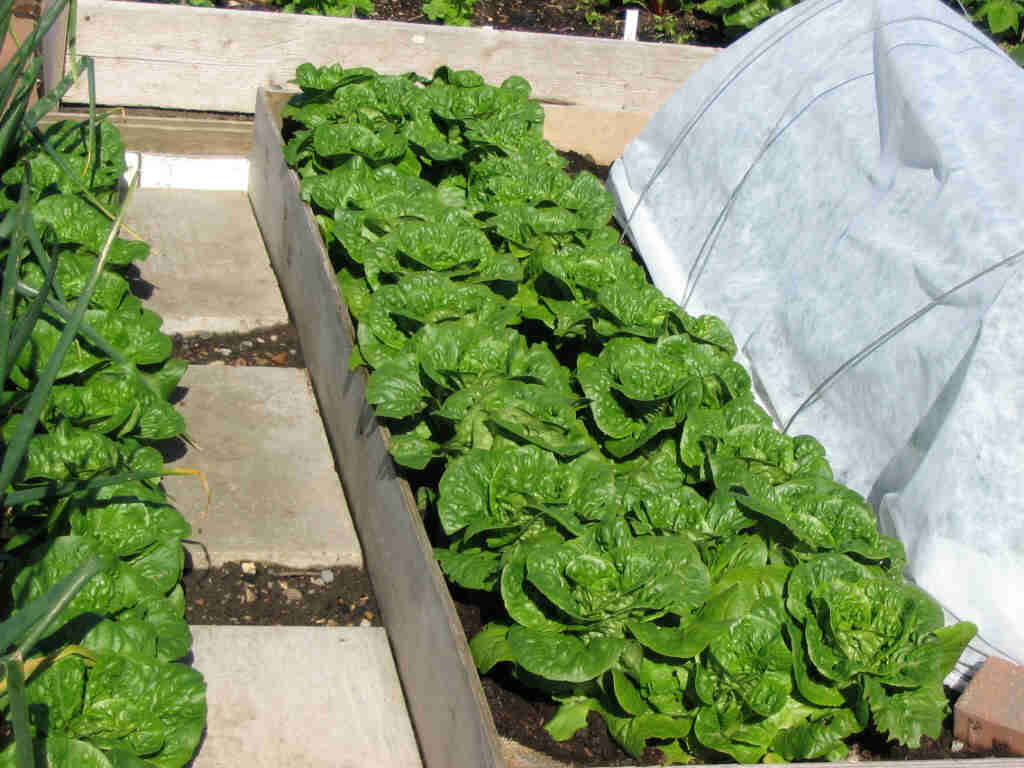Do you think you need a big garden to grow a lot of vegetables? You really don’t! A 4-foot by 4-foot space can grow substantial amounts of fresh produce and help reduce your grocery bill.
Use your space wisely
When planting, space individual vegetable plants close together, following the minimum spacing recommended on the back of the seed packet.
This practice, often called intensive or high-density gardening, is based on the “Square Foot Gardening” approach promoted by Mel Bartholomew in the 1970s.
In addition to increasing the yield from the available space, vegetables grown close together block out most weeds, limiting the need for weeding.
For plants that need large spaces, such as broccoli or cauliflower, consider sowing a fast-growing crop like radishes in-between them. The faster growing crops can be harvested before the larger plants shade them out.
Another way to use your space efficiently is to sow a quick-maturing crop such as radishes, chard or mixed greens immediately after harvesting a longer-maturing crop. But, be sure to rotate crops in successive plantings (that is plant vegetables from a different family) to avoid a buildup of diseases and pests in the soil.
You might also consider going vertical; pole beans, cucumbers, squash, peas, tomatoes and other crops grow extremely well on vertical supports while taking up only a small area of soil.
No garden, no problem
You can grow carrots, zucchini, lettuce and most vegetables in pots or tubs on your patio.
Growing vegetables in containers is a great way to get children interested in gardening and can make the garden more accessible for those with physical challenges.
You can also plant vegetables in a bag of potting soil. Lay the bag flat and cut multiple 1- to 2-inch drainage slits in the bottom. Turn the bag over and remove a rectangle of plastic from the top of the bag and plant starts or seeds right into the potting soil.
Potatoes can be grown in sacks made of a permeable material such as landscape fabric that are 12 to 18-inches in diameter and 18-inches tall. Six fingerling potatoes yield about 6-9 pounds of tasty new potatoes.
Use all four seasons
As the weather cools, you can still produce good vegetables as long as you give them shelter from adverse weather. Focus on plants that grow better in cooler temperatures including chard, spinach, leeks and kale.
Cold frames can be made from wood, bricks or straw bales with a transparent cover such as an old window to allow in light and help keep the temperature up. Row covers, plastic covered tunnels or hoop houses will also extend your growing season.
Growth in these sheltered areas will be slower than in the summer, but you can grow vegetables year-round using them.
Give back to the soil
Intensive cultivation and succession planting can quickly deplete nutrients in your soil.
Whenever possible add compost or an organic fertilizer immediately after harvesting a crop to maintain soil fertility.
Intensive cultivation of vegetables is not difficult, does not even need a garden and can be a whole lot of fun. Give it a try!
Bob Cain is a WSU-certified Clallam County Master Gardener.
‘New Vegetable Varieties’
Make sure to join us for the upcoming Green Thumb presentation, “New Vegetable Varieties,” presented by Carol Miles, Director of Washington State University’s Mount Vernon Northwestern Washington Research and Extension Center, from noon-1 p.m. on Thursday, Aug. 11, on Zoom. Get the link at extension.wsu.edu/clallam/master-gardener-calendar, or join by phone by calling 253-215-8782 (meeting ID 920 0799 1742, passcode 709395).
Miles will explore interesting new vegetable crops that can be grown in western Washington — such as sweet potatoes, bulb fennel, cantaloupe and popping beans. She will also talk about general production information, which varieties are suitable for our area and handling procedures to ensure success.
Green Thumb presentations cover basic gardening topics relevant to most home gardeners. Seminars are free, but donations to help support the WSU Clallam County Extension Master Gardener program or Master Gardener Foundation of Clallam County are appreciated.


